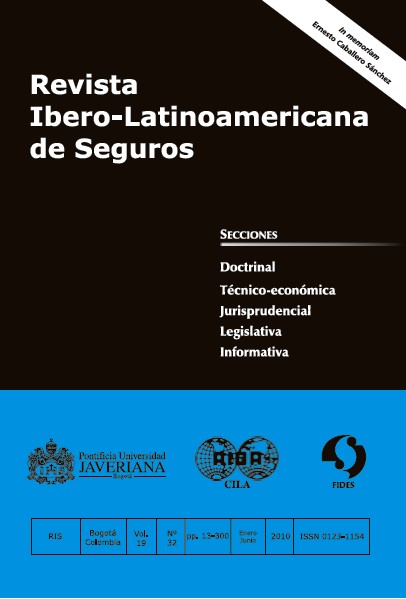Abstract
The article presents fundamental aspects regarding the direct legal action of a
victim in the civil liability insurance policy based on the Colombian experience.
The revision in-depth of the background of Law 45 of 1990 that begins with a
presentation of the international history and then the Colombian one; the amendment itself introduced thereby and a focus on the research presented in the preamble to the Congress and by the Minister of Finance of the time is worth noting. In addition, the interesting position of the jurisprudence related to the legal direct action is shown and a conclusion is drawn in the sense of indicating aspects that are pertinent with regard to the direct action itself, including issues such as the “litisconsorcio cuasi-necesario” (joinder of parties in a proceeding), the obligation of information to the victim regarding the existence of the insurance policy, statute of limitations, arbitration clauses, asymmetry between the coverage of the insurance policy and the indemnity to be made effective by the insured party, the notice about the loss and finally the “proceso ejecutivo” (judicial collection proceeding).
This journal is registered under a Creative Commons Attribution 4.0 International Public License. Thus, this work may be reproduced, distributed, and publicly shared in digital format, as long as the names of the authors and Pontificia Universidad Javeriana are acknowledged. Others are allowed to quote, adapt, transform, auto-archive, republish, and create based on this material, for any purpose (even commercial ones), provided the authorship is duly acknowledged, a link to the original work is provided, and it is specified if changes have been made. Pontificia Universidad Javeriana does not hold the rights of published works and the authors are solely responsible for the contents of their works; they keep the moral, intellectual, privacy, and publicity rights.
Approving the intervention of the work (review, copy-editing, translation, layout) and the following outreach, are granted through an use license and not through an assignment of rights. This means the journal and Pontificia Universidad Javeriana cannot be held responsible for any ethical malpractice by the authors. As a consequence of the protection granted by the use license, the journal is not required to publish recantations or modify information already published, unless the errata stems from the editorial management process. Publishing contents in this journal does not generate royalties for contributors.


